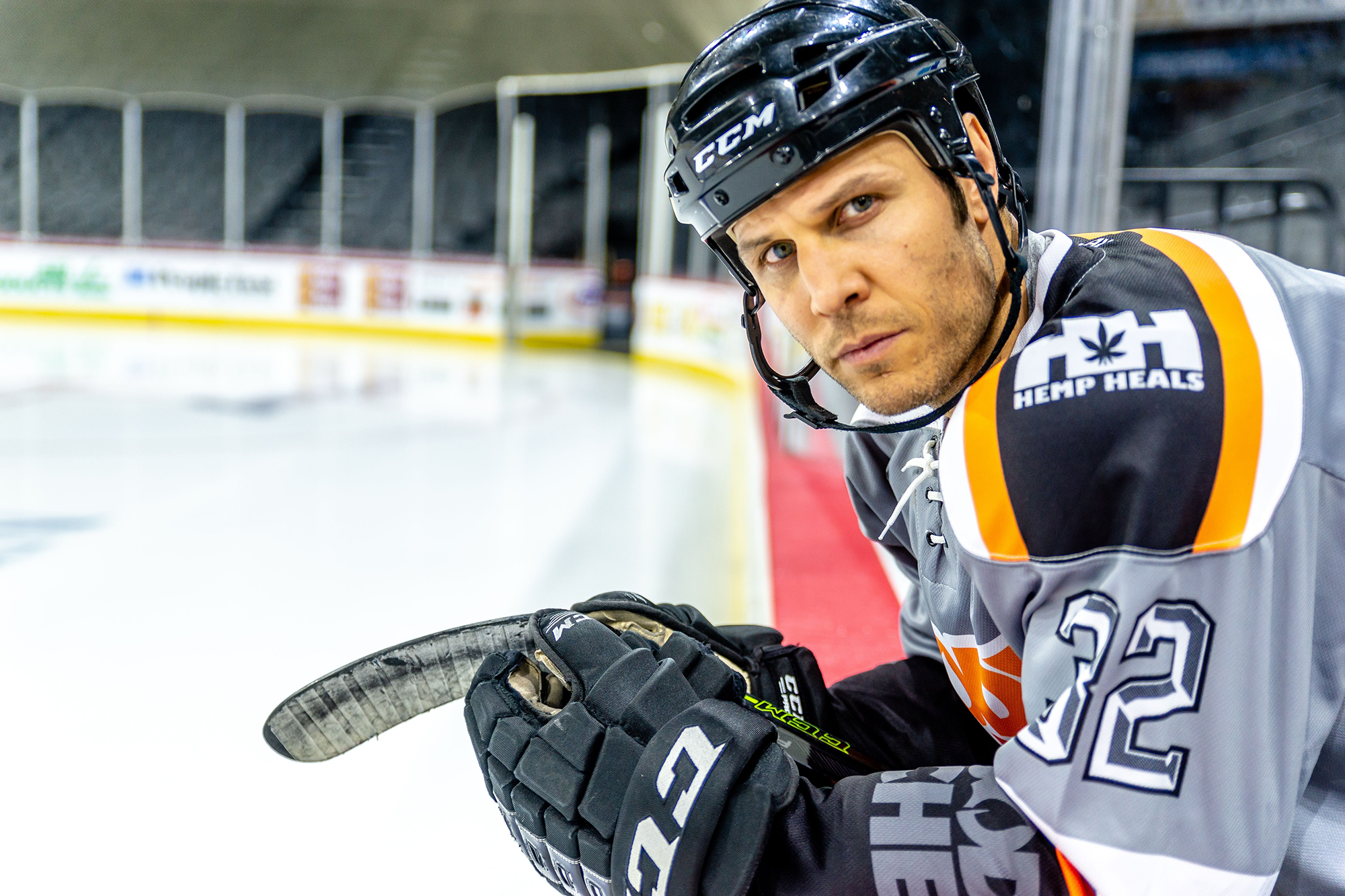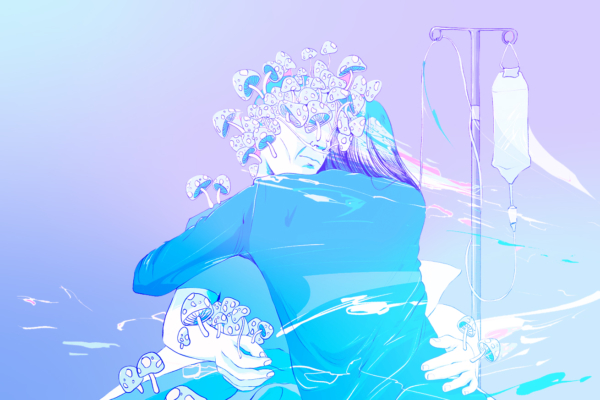
For fans of the game of hockey, the only thing more exhilarating than the blare of the goal horn after their team scores is the moment when a player finally takes the bait — after countless minutes of chirping, a few heavy hits, and maybe a poke or two from a stick — and drops the gloves. The moment the ice rink transforms into a boxing ring.
In years past, chances were that the player instigating the fights was known as an Enforcer. The role of the Enforcer has become as rare to find out on the ice as a payphone in public, mostly due to more stringent rules and protocols instituted by the NHL with the intention of protecting the physical well-being of its players.
With this shift in the style of game, Riley Cote, a former member of the Philadelphia Flyers organization from 2006 to 2010, can very much be considered one of the NHL’s last true enforcers.
To describe Riley’s professional playing career as “physical” would be quite the understatement. At 6 ft 2 in and 220 pounds, the Winnipeg Manitoba native developed a reputation on the ice as one of the toughest players in the league.
From 2002 to 2010 Riley racked up more than 50 fights, making the penalty box a home away from home. Riley spent 411 minutes in the sin bin throughout his career, delivering anything but love in the city of Brotherly Love.
As much respect as Riley earned from his teammates and fans for wearing the role of Enforcer with the Flyers on his sleeve like a badge of honor, the toll that this level of physicality began to take on him physically and mentally became draining.
And as if delivering heart-stopping body checks along the boards on a nightly basis wasn’t exhilarating enough, many of Riley’s postgame evenings were spent indulging in a lifestyle of late night parties, heavy drinking, and the consumption of illegal substances — a far cry from the rest and recovery any professional athlete needs after being subjected to the intense physical and mental stimulation of a game.
As bad as the physical pain and discomfort got from the constant hits, bumps, and body checks, the trauma that began to creep into Riley’s state of mental well-being is what steadily became a fight he was starting to lose. Perhaps for the first time in his life, Riley found himself going blow-to-blow with an opponent that was not only not crumbling to the ice but was succeeding in dropping him to the ice. And this time Riley was not in a donnybrook with a rugged linesman with only enough teeth left in his mouth to count on one hand. Something far more devastating was chipping away at his mental health.
Recognizing his deteriorating state of mental health, Riley, at the age of just 28, decided that he had dropped the gloves for the last time in his playing career, and announced his retirement.
Going from living as a professional athlete at a constant 150 miles per hour, where each day your focus is on the game, to the sharp and sudden slowdown that comes with retirement at first proved challenging. Riley slowly began a process of rediscovering a variety of different plant and fungi-based substances with natural healing attributes, such as psilocybin, that he had previously only relied on for recreational purposes. Through this process he began to gain an upper hand on the mental trauma that had pinned Riley up against the boards for the previous several years of his life.
Today, at 38, Riley finds himself appreciating an entirely new perspective on life, and through mindful, responsible integration of psychedelics, plant-based medicines, and yoga, he has managed to keep his struggles with mental trauma and substance abuse confined to the penalty box.
I was fortunate to spend a few minutes chatting with the ex-NHL enforcer, and have him share his story with me. We talked about his current and ongoing business venture with BodyChek Wellness and how together they are helping to create a “checking mindset” when it comes to mental and physical health.
DF: For folks out there who may not be hockey fanatics, how would you, a former Enforcer in the NHL, describe what exactly an Enforcer is?
RC: Essentially, an Enforcer was the guy that was the sacrificial lamb, if you will. The guy that is going to go out and put his physical body on the line in situations in the game where this is disrespect, like cheap shots, or when your team needs a momentum change. So a guy like myself would go on the ice and third up. And so there were a couple of easy ways to get fights, and one was to poke the goalie where you know you would be swarmed by his teammates, and the other is to get a big hit and put the puck in the corner and run somebody over. But the role is basically extinct now and when I got out of the league in 2010 it maybe lingered for two or three years afterwards. Teams still carry a heavy weight and there is still fighting in hockey, but there really is no designated role anymore for that specific guy where you’re going out for four to seven minutes a to bang fight and take care of business.
DF: As much as fans typically tend to enjoy the hits and the fights we see during the games, we often times tend to not understand the physical toll that it takes on players and the lingering effects it contributes to even after retirement. And I am not just talking about dealing with a bad hip or shoulder, but the toll on the brain that it takes which is understandable when you see the blows to the head that players are subjected to throughout their career. How did being subjected to that level of physicality over the course of your career contribute to the mental trauma you have experienced?
RC: For me it’s really hard to identify exactly where some of the issues really came from. Obviously getting punched in the face for eight years in professional hockey is not good for the mental health of the brain which I think we can all agree on. For me personally, and I think a lot of guys can attest to this, is the intersection of that component, the repeated head trauma, and the substance abuse. The partying and the alcohol dehydrates the brain and staying up late and not getting proper rest are not beneficial for brain health and longevity. Part of my story is over partying and substance abuse. The physical part of it was almost the easy part. It was the emotional, spiritual toll it took on me to jack myself up and put myself in a mindset each night to potentially fight and that current state of anxiety that it would contribute to. I got swallowed up in that role and sometimes forgot to even play hockey because I was always thinking about the next fight. And so when I retired and when I was observing some of my issues in my life and my situation, and talking to military veterans I began to realize that what I was experiencing was along the lines of PTSD. When I got into coaching after I retired, I would hear the national anthem and would have flashbacks of fighting almost like an induced anxiety.
DF: I know there are probably some people out there wondering why the need, throughout your career, to be so physical and to get in so many fights. Would you like to touch on that?
RC: I was just an average, normal kid from Winnipeg, Manitoba who loved to play hockey and basically would do anything to play in the NHL and live my childhood dream. I was wasn’t a kid who was making trouble on the streets or who had a natural thirst for violence. But I realized I wasn’t a good enough hockey player and being as competitive as I am, found myself fighting out of a sense of fear and survival – to survive in hockey, which is something I was able to identify after the fact through my clinical experiences with mushrooms.
DF: Talk to me a little bit about your experience with microdosing and the effects it has had on you?
RC: I had a relationship with mushrooms for a good part of my life but mainly on the macro level and recreationally at festival and parties. It wasn’t until four years ago that I started to learn about microdosing psilocybin and LSD and it clicked right away. Not everyone wants to experience that psychotropic effect and with microdosing it ends up being more of like a mood regulator that helps with focus and clarity without having to take a deep dive or get uncomfortable.
DF: Based on your own personal observations, do you believe that more people are starting to consider microdosing as a legitimate mental health treatment?
RC: I get a lot of people asking me about it because it’s becoming mainstream. From pro sports guys, to high-end performers and coders in Silicon Valley, you name it. People are finding a ton of success using psilocybin in small doses for productivity and workflow. And I could be wrong, but I feel like the psychedelic space attracts more true, genuine healers and people in it for the right reasons versus cannabis.
DF: Where would you like to see things go with the psychedelic space?
RC: In a perfect world I would love for human beings to be able to govern their own health and their own bodies and spirits the way they choose to. But I think there is going to need be a middle ground where it is packaged up safely in a clinical setting or retreat type of environment where there are psychotherapists involved and a true focus on ceremony and ritual integration and where integration starts before you even step foot on a plane and you already know what to expect and already start reeling in the energy and being more mindful. So, I would love to see people have the ability to go through a legitimate medical program similar to the Wake Clinics where it is being done the right way in a safe environment. But I would also like to make sure that people have absolute access to it where they don’t have to go through all of these loopholes.
DF: You are currently a Partner at BodyChek Wellness which is a company you helped to form in 2017. Do you want to tell me a little bit about what work BodyChek Wellness is involved with and how it came to be?
RC: After I retired, I really got into nutritional healing, plant medicines and sustainability and began using the sports platform to get the good word out there. I ran into a lot of athletes from different sports that had a lot of similar issues that I had been dealing with between concussions, repeated head trauma, and substance abuse, and we started speaking on these panels with medical professionals just to validate the science of what we were talking about in terms of the issues we were experiencing. And eventually I got to a point where I really realized that I had to use the sports platform to my advantage to normalize my experiences as much as I possibly could and develop a non-traditional approach to recovery. And so, with BodyChek Wellness we developed a hemp-derived, CBD, and functional mushroom line of products that are designed to promote stress management, focus and clarity and building immunity. And we are talking about supplements that are not just for athletes, but your soccer moms, Yogi’s, and weekend warriors and really something that is just not for everybody, but for every body.
DF: Knowing that you are not the only professional sports athlete to struggle with the challenges of mental health, how important is it for there to be an environment where athletes are comfortable speaking up about the issues and struggles they may be going through from a mental perspective?
RC: I think the more people that come out and talk about it the better. I mean guys still bottle stuff up and part of my story and what I’m trying to represent is this façade of toxic masculinity. I used to be the biggest meathead walking around and felt that I had to uphold this physical presence just to be worthy enough and be this tough guy. Now I look back and laugh at how my thinking was back then and really wish I wouldn’t have thought like that because I would have been such a more mindful fighter and a better hockey player.





